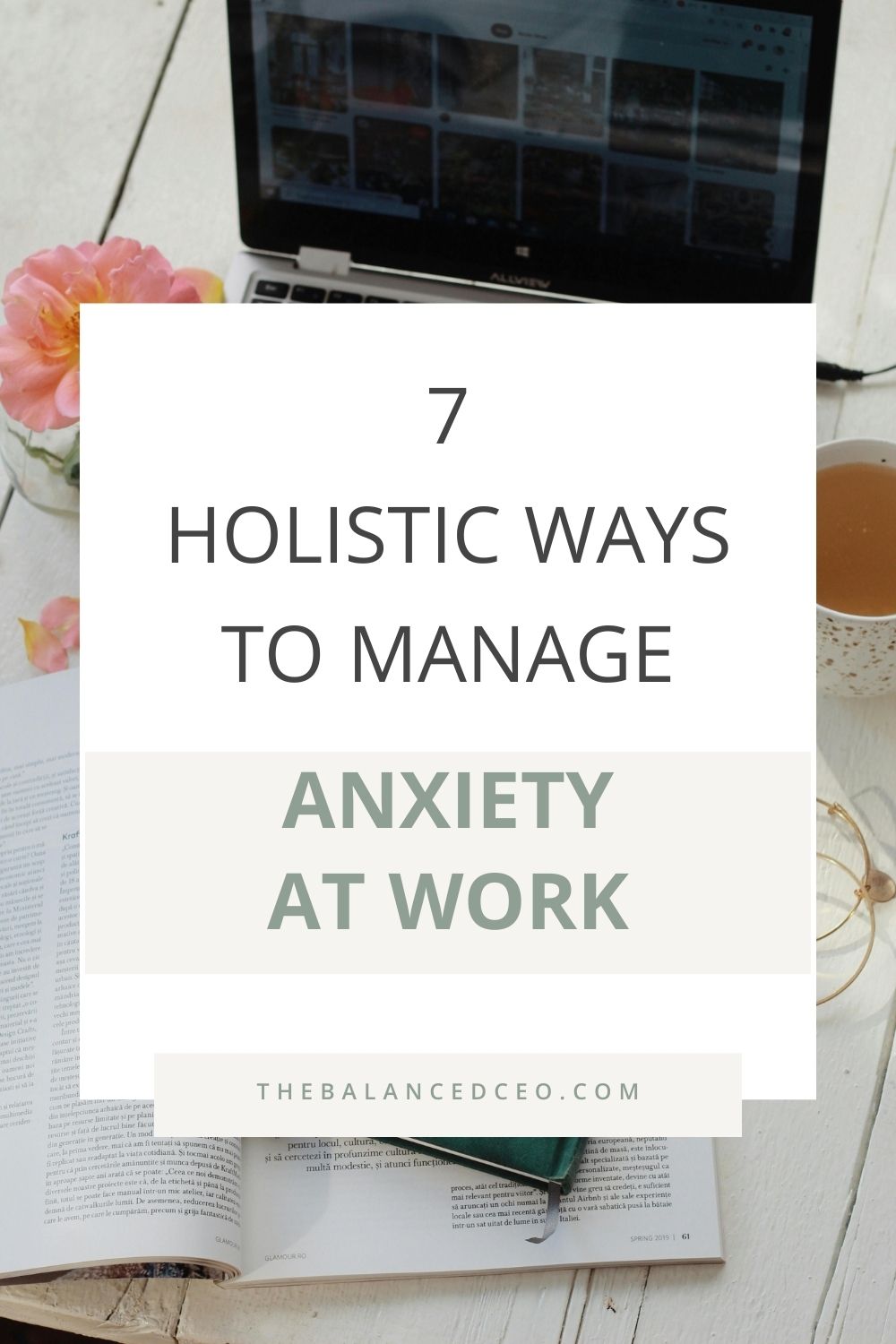This post may contain affiliate links, which means I’ll receive a commission if you purchase through my links, at no extra cost to you. Please read full disclosure for more information.

Anxiety is your body’s alarm system that goes off when you’re stressed. Believe it or not, some stress can be helpful to you at work. It keeps you alert and ready to avoid risks.
Still, when this feeling keeps bothering you, it can make concentrating on your job especially challenging. That’s where natural ways to manage your anxiety come in handy. By implementing various techniques for stress management, you keep your worries at bay, making your workday much smoother.
What Is Anxiety?
Anxiety is your body’s response to the stress you feel when worried, and it can be mild or severe. Everyone feels anxious now and then. However, women are twice as likely to develop anxiety disorders as men. Signs and symptoms of anxiety include:
- Restlessness
- Tiredness
- Insomnia
- Stomach problems
- Rapid breathing
- High heart rate
- Difficulty concentrating
You may often experience anxiety at work because of new changes or challenges you’re facing. Other times, it could be because of personal problems or health-related issues.
When anxiety keeps up, it can turn into an anxiety disorder. This means your brain’s response to stress is stuck in the “on” position, making everyday tasks much harder. To prevent your anxiety from reaching this stage, you must learn how to manage it before it starts affecting your work performance.
Natural Remedies for Anxiety in the Workplace
Take control of your anxiety by using several helpful strategies to reduce stress and boost productivity. While you can use certain CBD vapes and other products outside of work with the help of the right CBD provider, you may not be able to use it in the office. Having a back up way to cope with anxiety during work is a must, and we’ve got the list you need below.
1. Practice Mindfulness and Meditation
Mindfulness is a meditation technique that helps to bring anxiety down to a low level. When you have anxiety, you’re sucked into your thoughts, getting you stuck in a state of worry. However, mindfulness meditation works to ground you so you’re more aware of what’s happening at the moment.
When you’re having a moment of worry or fear, take a few minutes to sit quietly and focus on your breathing. Your mind may start to wander to work tasks and stresses. When this does occur, ensure you gently bring your attention back to your breathing.
Focus on how you feel and your surroundings. Use all your senses to calm your mind. Meditation can deactivate the sympathetic nervous system and help you find peace during stressful moments.
2. Stay Active
Exercising is an excellent remedy for reducing stress. Physical activity helps by releasing chemicals in your brain like serotonin — a neurotransmitter responsible for regulating mood and making you feel good.
When you start with exercise, you can choose to go with something heavy like high-intensity interval training (HIIT). Or, you could begin with low-impact workouts like yoga or taking a brisk walk during lunch. Even the smallest actions can reduce tension, clear your mind, and boost your mood.
3. Eat a Well-Balanced Diet
Fatty, processed foods with lots of sugar have an overall effect on your mood and body. A diet rich in fruits, vegetables, whole grains, and proteins provides the nutrients your brain needs to function at its best.
Additionally, it helps to hydrate your body throughout the day. Drinking plenty of water will ensure you feel less stressed and anxious. Try limiting your caffeine intake as well. Coffee and energy drinks worsen your mood by causing jitters and a crash in energy levels.
4. Use Therapeutic Supplements
One effective natural strategy to help manage and reduce anxiety at work is using therapeutic supplements such as reishi supplements. Derived from a mushroom renowned for its potential stress-reducing properties, reishi could help manage anxiety. Some studies link reishi to the alleviation of fatigue and depression, common indicators of sustained anxiety. Always consult your healthcare provider before adding new supplements to your routine, particularly if you have existing conditions or take other medications.
5. Get Adequate Sleep
Sleep is crucial for regulating your body’s functions, including your mood. When you feel like you’re running on empty, this can make you more irritable, less focused, and more prone to anxiety. While getting enough sleep may be easier said than done, you must get at least seven hours each night.
To improve your sleep, get yourself into a relaxing nighttime routine. Doing so will train your brain to know when it’s bedtime. You can try reading or taking a warm bath. Keep your room cool and completely dark. It helps to use a noise machine or fan, and you should avoid screen time to make it easier to fall asleep.
6. Manage Your Time More Wisely
When feeling organized and in control of your tasks, you’re less likely to feel overwhelmed. Start managing your time more wisely by prioritizing your tasks. Create a weekly schedule in your planner to keep track of deadlines and appointments.
Create a weekly schedule in your planner or get a printable monthly calendar to keep track of deadlines and appointments.
Make your schedule as realistic as possible because putting too much on your to-do list can trigger stress. Even if you miss a task on your schedule, it’s ok — you can always return to it later.
One thing to remember, though, is to schedule time for yourself. This way, you give yourself time to recoup and recharge your brain. It will help you complete your tasks much faster and keep your anxiety in check.
7. Set Boundaries
Setting boundaries is crucial for putting your needs first. This means you must know your limits and ensure others are aware of them. This might involve saying no to an extra project when swamped. Or, it could be that you need to clarify that you’re unavailable to answer work calls or emails after hours.
It’s important to communicate these needs clearly to your colleagues and boss. This way, they can understand how to support you. Also, you must set boundaries for yourself.
For instance, you should know when to take a break and step away from your desk. In turn, you give yourself space to breathe to stay more focused. By establishing healthy work-life boundaries, you can protect your mental health and improve your well-being.
8. Seek Support
If you feel your anxiety is getting out of hand, it’s important to remember that you’re not alone. Talking to someone you trust can provide a sense of relief and may offer new solutions to manage your stress.
If your workplace offers it, consider contacting a professional counselor through an employee assistance program. Talking to an expert can help you learn how to deal with anxiety and provide coping strategies.
Whether you seek help from someone you know or a professional, know that their support will relieve you. As such, managing work challenges and building a healthier mindset becomes easier.
Also, to reduce anxiety when it comes to upcoming interviews and get complete preparation for your assessment test at JobTestPrep.
Ease Your Stress at Work With Natural Coping Mechanisms
Anxiety can feel suffocating, but incorporating some holistic approaches can make your professional life more enjoyable and productive. While stressful situations may always occur, have patience with yourself. Coping mechanisms take time to build as a habit. Yet, once you’re more consistent with your strategy, you can include them into your daily routine and create lasting benefits.

Cora Gold
Contributor
Cora Gold is the Editor-in-Chief of Revivalist magazine, a publication dedicated to happy, healthy, and mindful living.





Leave a Reply